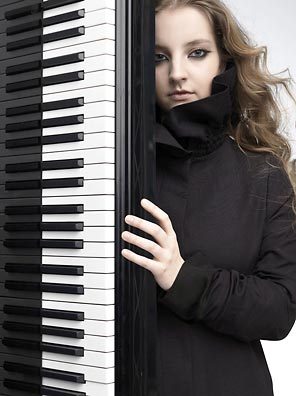De la Salle moves from cool to fiery in Boston recital debut

Lise de la Salle made her Boston recital debut Saturday night at Jordan Hall.
In a moment she was transformed, from cool clinician into stormy adventurer.
Saturday evening’s Celebrity Series event at Jordan Hall brought French pianist Lise de la Salle to town, featured two different musical sides of the 23-year-old Parisienne.
The first, on display throughout the published program, was introspective and almost aloof. Ravel’s Miroirs, a half dozen Debussy Preludes, and two Beethoven sonatas (Les Adieux and Moonlight) were all delivered with artistry and care, but also with surgical precision.
Truth be told, it wasn’t her, it was the music. The French portion featured impressionistic, non-linear compositions that kept de la Salle’s prodigious physical talents under wraps. No finger-stretching octaves, no blazing runs, just carefully sketched-out phrases and musical allusions requiring deep attention from everyone in the room, not just the artist.
It was magical. Miroirs shows off five personalities, and de la Salle inhabited each one like it was her own. A stalwart left hand, now bolting down the bass line, then reaching over delicately for overhand accents, finally venturing some complex rubato, was riveting. In-between, her right hand investigated Ravel’s shifting motives, some long phrases that required an artist’s sensibility to come to life, others wisps of ideas that came and left. Alborada del gracioso, a Spanish flavored aubade had the most charm, yet all proved engaging.
De la Salle assembled a pastiche from Debussy’s two books of Preludes, stitching together half a dozen with no regard to the composer’s sequence. Her choices kept the mood quiet, with only a mild crescendo, coming from Feux d’artifice, the published finale, at the center of the set. Up to this point, the program was extraordinarily delicate, sonically reserved, though de la Salle’s concentration carried across the stage.
Her Beethoven was substantial but less compelling. Les Adieux can be a challenge, even for late career artists. Its emotional power mixes farewell with appreciation, not exactly black and white, as Alfred Brendel once pointed out. A chance to carefully delineate the differences in the two themes of the first movement, one slow, in three chordal accents, the other freer and faster, was not articulated as well as it could have been. Both subjects return repeatedly, and subsequent fingerings marked their differences more distinctly.
The Moonlight sonata was a connoisseur’s delight. Often over-emoted, imbued by passions from anxious interpreters, de la Salle instead kept to the score, observing its gentle dynamics. The brief second movement again allowed for sophisticated rubato. The finale hinted at the unbuttoned encores to come, passionate, frisky and lovingly joyful offerings of Bach, Chopin, Prokofiev and Schumann.
Posted in Performances